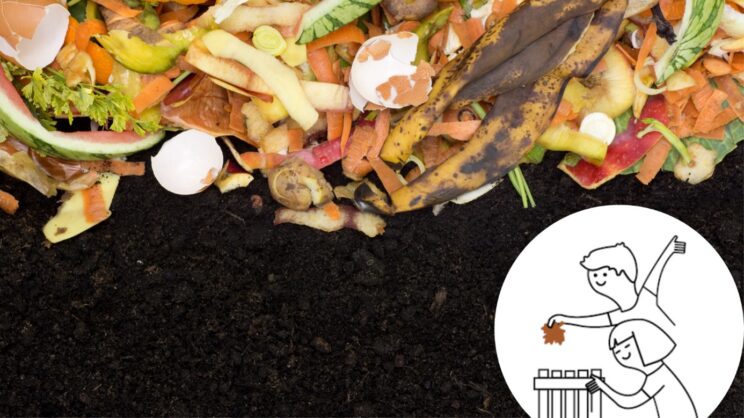
Did you know that nearly half the waste a home produces is organic in origin?
Selective collection of organic waste began in 17 ground-breaking areas of the city of Madrid In October 2017, and in September 2020 the implementation of this new collection system was rolled out to the 21 districts of the city.
Two years later, this new habit has successfully become part of the waste separation and management routines of households and business establishments alike. Once this waste is placed in the brown bins, it is collected and transported to Valdemingómez Technology Park to be transformed into biogas and fertilizer, though it can also be treated domestically, at home or community composting sites.
But… what is composting?
Composting is the process by which organic matter decomposes and is transformed by different microorganisms and small invertebrates (bacteria, insects, fungi, worms…) in the presence of oxygen. As a result of this process, we obtain compost, an organic fertilizer that is highly beneficial for the soil, as it improves its fertility, structure and water retention, preventing soil erosion and degradation.
What do we need?
If you have a large plot of land, you can try composting in a pile, storing the waste directly on top of the soil in a particular section of the plot. Otherwise, you will need a composter, which you can make yourself by reusing materials such as strips of wood, pallets, fruit crates… or just buy one (they come in different models, materials and sizes).
Secondly, you should bear in mind that a composter should ideally be placed in direct contact with the soil to allow the organisms in the soil to come into contact with the waste in the composter and for natural moisture regulation.
However, there are certain types of composters that can be set up on terraces or asphalt surfaces that have a base with a liquid collection system.
What waste can we include in the process?
As you already know, although we can put many kinds of organic waste in the brown bin (you can see what they are here), for the composting process it is very important to avoid adding: meat and fish scraps, dairy products, oversized branches, chipboard or plywood and, above all, any type of inorganic material.
What factors should we take into account?
In home and community composting, a number of variables must be taken into account:
–Temperature: as the decomposition process progresses, the temperature increases and can reach up to 70ºC (although in small composting machines the temperature is usually somewhat lower). To monitor the temperature of the process, a thermometer will come in handy!
–Humidity: microorganisms need water to live, so it is important to regulate the humidity of the process and add water when necessary.
– pH: bacteria generally prefer a close to neutral pH, so the optimal ranges for composting are between 5.5 and 8.0. To maintain these ranges, we need to consider what type of waste we add to the process. For example, the remains of citrus or cypress leaves can acidify the process.
–Aeration: we must prevent the material becoming too compact, by using a tool like a shovel, a rake or special aerators to turn over and aerate the mixture.
–Volume: size is important in the decomposition process. The smaller the materials we use, the easier it will be for microorganisms to decompose them, so it is important to cut up the plant waste before adding it.
Ready to start composting?
Here are some digital resources you might find useful:
- Communal composting guide. A benefit for the city. Huertos de Madrid (Kitchen gardens). Environment and mobility dept. Madrid City Council. 2018
- Composting manual published by the Ministry of the Environment and Rural and Marine Affairs. 2004
- Composting manual for proper management of urban waste, published by Sogama (Galician Society for the Environment).
If you need further information and you belong to an association, educational or community centre, don’t hesitate to ask about our composting sessions by mail: comunica.limpiezaresiduos@madrid.es We’ll be happy to come and visit you!
Composting and using organic waste is easy for everyone!
